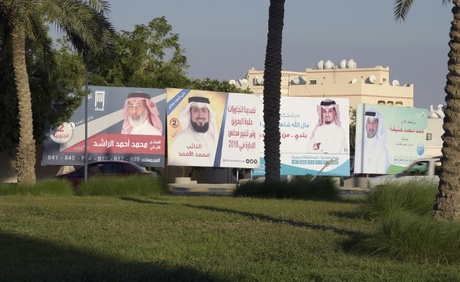Bahrain Holds Vote amid Boycott Calls
إقرأ هذا الخبر بالعربية
Bahrain holds a parliamentary election Saturday amid boycott calls from dissolved opposition groups which have been banned from taking part.
The country's two main opposition groups, the Shiite Al-Wefaq and secular Waad, were barred from fielding candidates.
The polls opened at 8am local time (0500 GMT) and are set to close at 8pm.
King Hamad in September urged voters to take part in the vote, in which officials say 293 people -- including 41 women -- are running for parliament.
A municipal poll coincides with the parliamentary vote.
The tiny Gulf kingdom has been hit by ongoing unrest since 2011, when security forces crushed Shiite-led protests demanding a constitutional monarchy and an elected prime minister.
Opposition parties shunned the last elections in 2014, the first since the 2011 crackdown, denouncing the vote as a "farce".
More than 350,000 Bahrainis are eligible to vote in Saturday's poll, according to justice minister Sheikh Khalid bin Ali al-Khalifa, adding that there were 54 polling stations across the country.
On Saturday, the interior ministry warned voters to "dismiss rumours that affect the electoral process".
It urged citizens to depend on "reliable sources" after people reportedly received text messages warning them not to head to polling stations as they had been stricken from the electoral roll.
At least six people were detained and charged this month for "obstructing the electoral process", according to Bahrain's public prosecutor.
One of the six was Ali Rashed al-Asheeri, a former member of parliament with Al-Wefaq, according to the London-based Bahrain Institute for Rights and Democracy.
Asheeri had tweeted that he and his family would boycott the polls.
Al-Wefaq called for a boycott of this year's parliamentary election after a law issued in June barred "leaders and members of political associations dissolved for violating the kingdom's constitution or its laws" from fielding candidates.
- 'No substance' -
Experts have questioned the value of a parliamentary election in which the opposition is not allowed to participate.
Neil Partrick, a specialist in Gulf Arab politics, said Bahrain's elections "have lost all practical and political meaning" since the 2010 boycott by Al-Wefaq -- the main movement representing the country's Shiite population.
"The subsequent outlawing of Al-Wefaq, and of the relatively liberal, cross-sect, Waad trend, has merely underlined the meaninglessness of Bahraini elections," he said.
He said such polls had "no political or practical substance" regardless of boycott calls.
Since 2011, authorities have imprisoned hundreds of dissidents -- including top Shiite opposition leader Sheikh Ali Salman, who headed Al-Wefaq -- and stripped many of their nationality.
Amnesty International said Friday it was "gravely concerned" by Bahrain's suppression of political opposition
"Over the past two years, the crackdown in Bahrain has seen the political opposition detained, intimidated and silenced," said Devin Kenney, the rights group's Bahrain researcher.
"We call on the authorities to stop this ongoing and escalating repression and to allow free expression of dissenting voices, including those who oppose the monarchy."
According to Jane Kinninmont, an analyst specialising in Gulf politics, many citizens will either boycott or "simply not bother to vote" in this year's elections.
Bahraini authorities accuse Shiite Iran of provoking unrest in the kingdom. Tehran denies the allegation.
Human rights groups have frequently said cases against activists in Bahrain -- men and women, religious and secular -- fail to meet the basic standards of fair trials.



